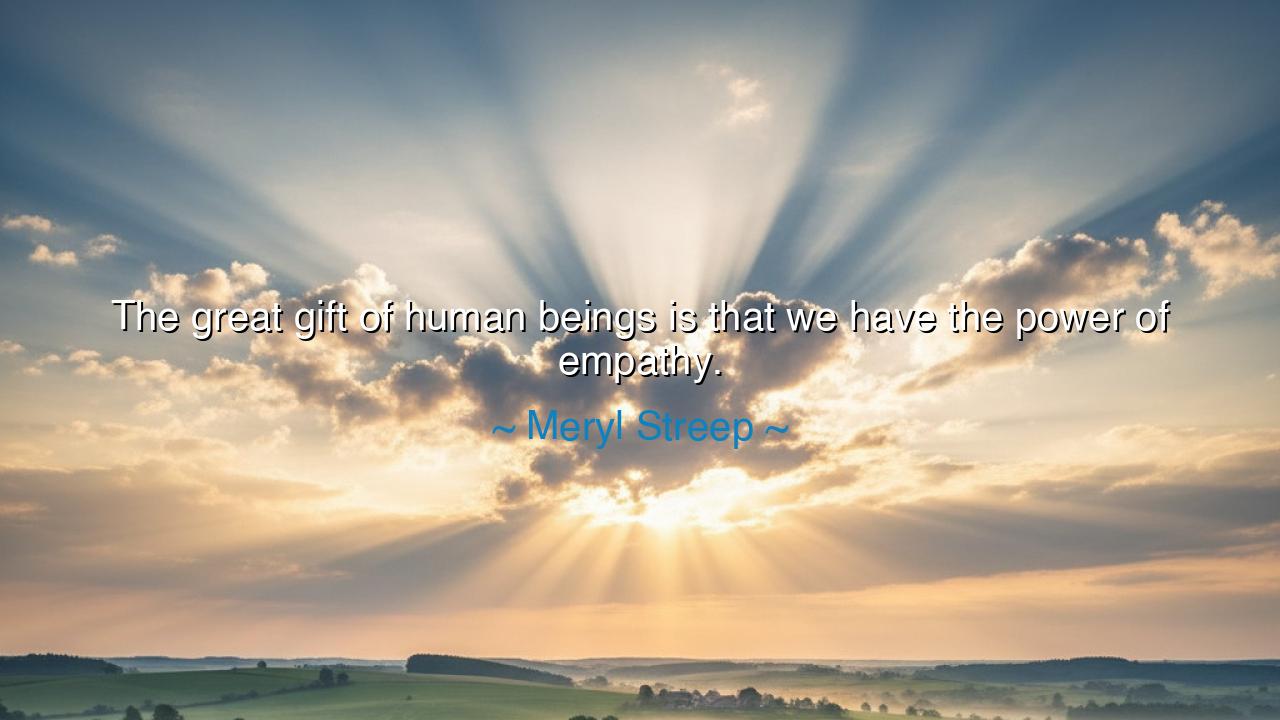
The great gift of human beings is that we have the power of






The words of Meryl Streep — “The great gift of human beings is that we have the power of empathy” — are a quiet revelation of what makes humanity sacred. They remind us that, beyond intellect and invention, beyond art or achievement, the highest faculty of the human soul is its ability to feel the pain, joy, and hope of another as though it were one’s own. Empathy is not merely a sentiment; it is the divine bridge that connects one heart to another. Through it, we transcend isolation and remember that we are part of something greater than ourselves — a living network of souls bound by compassion.
Streep, a master of inhabiting other lives through her craft, understands this power intimately. In every role she plays, she enters another’s world — seeing through their eyes, breathing their sorrow and triumph. But her words reach beyond the stage. They speak of empathy as the great unifying power of civilization itself — the force that makes love possible, that gives rise to justice, mercy, and peace. Without empathy, intelligence becomes manipulation, and strength becomes cruelty. But with it, even the smallest act — a hand extended, a word spoken in kindness — becomes an echo of eternity.
Throughout history, the mightiest transformations have not come from force, but from empathy. Consider the story of Abraham Lincoln, who in the midst of the American Civil War would read the letters of grieving mothers and trembling soldiers. It was not strategy that guided his hand toward reconciliation, but compassion — the capacity to feel the human cost of every decision. And when he spoke in his Second Inaugural Address of “malice toward none, with charity for all,” he was speaking from the deep well of empathy that saw not enemies, but suffering men caught in history’s storm.
Empathy has always been the seed of progress. It was empathy that stirred Florence Nightingale to leave her comfort and walk among the dying soldiers of Crimea. It was empathy that led Mahatma Gandhi to feel the pain of the oppressed as his own, and to forge from that pain a weapon more powerful than the sword. It was empathy that inspired Martin Luther King Jr., who said, “Injustice anywhere is a threat to justice everywhere.” These were not saints born from another world — they were men and women who refused to close their hearts. Through empathy, they became the conscience of humanity.
But empathy is not always grand. Often, it begins in the small and unseen — in listening, in patience, in the courage to understand before judging. To truly feel another’s suffering requires humility; it requires silencing the ego and allowing the heart to speak. Many wish to be right; few wish to understand. Yet it is understanding that heals, and it is empathy that turns understanding into action. A great civilization is not one that builds towers, but one that builds bridges between hearts.
Meryl Streep’s words also carry a warning: empathy, though a gift, is fragile. In a world driven by speed, distraction, and division, we risk forgetting it. We scroll past pain, we judge before we know, and we guard our hearts against feeling too much. But if we lose empathy, we lose the very essence of being human. For empathy is not weakness — it is the strength of the soul, the courage to remain open in a world that constantly urges us to harden.
So let this truth be carried forward like a sacred torch: cultivate empathy. Practice it in your words, your choices, your art, your daily living. When you meet another, ask not “What separates us?” but “What do we share?” When you witness suffering, let it move you to act, even in the smallest way. For in each act of empathy, the world is remade anew. As Meryl Streep reminds us, the power to understand and to feel with others is not just our greatest gift — it is the very light of our humanity, the spark that keeps civilization alive through every age of darkness.






AAdministratorAdministrator
Welcome, honored guests. Please leave a comment, we will respond soon